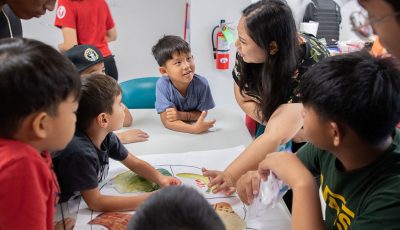NMI gets its first substance abuse recovery center
Three months ago, Reuben Chong relocated to Saipan from his home in Hawaii to embark on a pioneering journey to helping others struggling with addiction.
As a substance abuse counselor and a clinical social worker, Chong was inspired by Gov. Ralph DLG Torres’ commitment to address the island’s increasing drug problem through the HOPE recovery center.
“The problem with addiction is that it is an unseen emotion. It’s the spirit and the mind. We have participants who are looking for belonging. They are looking for a sense that they’ll be okay. I believe that human life has meaning and that has transitioned into my work,” Chong said.
A rehabilitation center in the CNMI has never existed before but now it does.
“The key to all this is education, in order to create a better life, no matter how long it takes. We provide information to build life skills and knowledge. At the end of the day, you are the expert on you. As a provider of services, I have to navigate that grayness. It is only when you leave these gates that true treatment begins,” he said.
According to Torres, addressing the issue of addiction requires a dedicated facility for initial, immediate and long-term care.
“With the establishment of the Substance Abuse and Rehabilitation program and funding for a drug court, we knew that we needed licensed clinicians and counselors at the forefront of addressing substance abuse and eventually other social issues that have plagued our Commonwealth for decades. It truly is a pioneering program, that I believe is the best investment in our people and in our future,” he said.
Chong noted that there has been positive progress in the program, with 100 percent compliance in drug results.
“I’ve been in this profession for several years, and you never really get to see the end result. I look at us as the pioneers of the recovery movement, and it took a lot of adjusting in terms of gauging the mindset of others,” Chong said.
He said that truly believing in something creates an emotional shift.
“It has been exciting, electrifying, stressful, but hopeful,” he said, adding that he was shocked to see how so many first responders struggle with addiction, along with other members of the community.
“But we’re all on the same level. I’ve been busted before. I know the system from both sides. We can understand the same language, and addicts are looking for a community to belong to. A way to forget all their problems. And even after removing the drug, they are still trying to fill a void. I want them to feel and know that today, you don’t have to use drugs to feel complete,” he said.
Participants have started with the mindset that drug use such as drinking alcohol is part of one’s culture instead of being just a social activity. Chong said that many who join the program eventually re-evaluate the value of their recovery.
“There is a paradigm shift in terms of traditions becoming culture. We judge ourselves by our intentions, and others judge us by our actions. What we try to do is use the resources to create a substance prevention mindset. I use a cognitive behavior approach, but the work is not easy. We are looking at the world with a different lens,” he said.
Chong said his personal upbringing and journey have enabled him to help clients open up.
To those struggling with addiction, he said, life is too short.
“I believe in wherever you go, there you are. The world is getting more complex, more compact, even more so if you have an addiction. I have been through this same journey, and you don’t want to walk on that side of the street, when we can walk on the other side together. Everyone has earned a place on Earth by virtue of being human. Life is too short and the choice we have to make is do we want to change or do we want to continue down this path,” he said.
As a baby, Chong was adopted and then was given up as a toddler and raised by the state of Hawaii.
“I was a latchkey kid and once I turned 17, I joined the military. After I got out, I never felt like I belonged. I never got it the first time, the second, or the third but I knew I wanted to change. Imagine, I was a high school dropout and now I have my master’s degree. Life is precious, and you can’t waste it,” he said.
The overall vision for the HOPE recovery center in Marpi is to have a sustaining facility that treats men and women as in-patients and outpatients.
“If you want to change the CNMI, you have to change communities. You have to reach individuals, and you need to reach their families,” Chong said.
Yvette R. Sablan, the special assistant for Substance Abuse and Rehabilitation, said that Chong comes to the Commonwealth at a critical time with years of education and expertise.
“So far, the participants have been pleased with him and I am grateful that he had made the decision to leave his home and to give to a community that is not of his own, but of a community that he can relate and engage with as he works on establishing and building that sense of belonging with and for them. The SAR program is hugely appreciative of his passion and untiring commitment,” Sablan said.
The HOPE recovery center is currently renovating more buildings and is staffed 24 hours with counselors or behavioral health technicians, with participants from the general public.
The center houses eight participants, with ongoing plans for the center’s expansion.
For more information or help, call 323-7277/78. (PR)



























